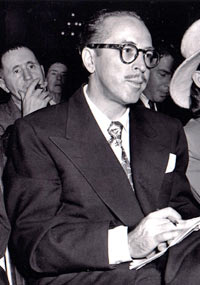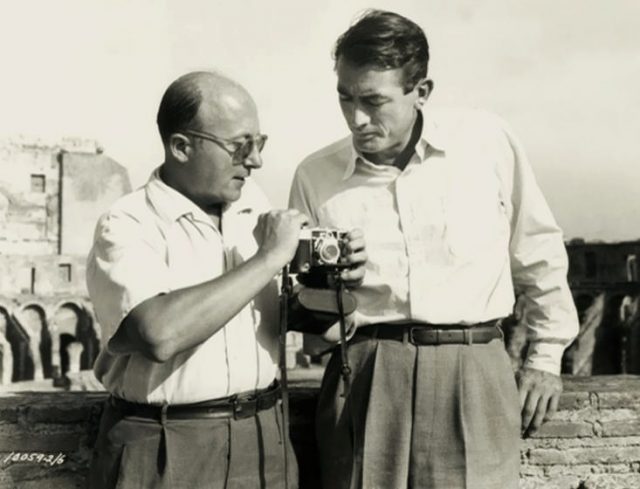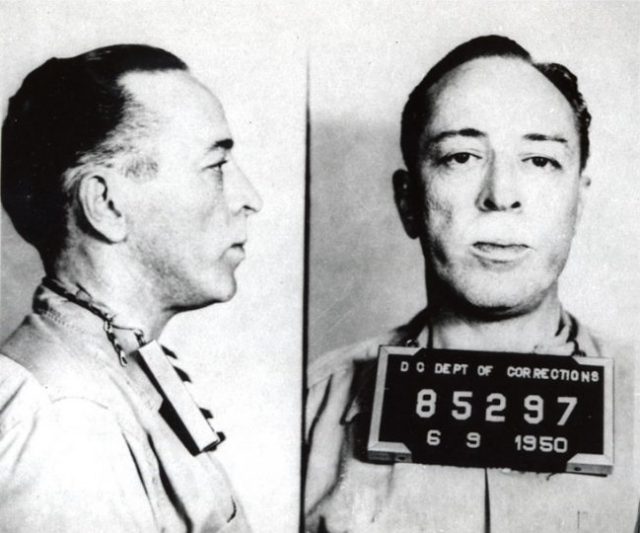After the Second World War was won by the Allied powers, the Cold War began, and the United States’ attitude toward the Soviet Union became one of distrust and fear, leaving many American supporters of the USSR in a hazardous position.
Since the times of the Great Depression, Hollywood studios produced films with social undertones. Sometimes the screenwriters, directors or actors were acting out of a passion for social causes; in certain cases, they were in communication with Communist Party leaders who were pushing for certain content to dominate the films. After WWII, many films came under scrutiny for being left-leaning, subversive, and anti-capitalist. In such a tense political climate, the House of Un-American Activities Committee and fear-mongering Senator Joseph McCarthy rose to power. In a number of public trials, artists related to the film industry were questioned regarding their political affiliation.
Among the first to be called on to state whether or not he was a member of the Communist Party―referring to the Communist Party of the United States of America, as well as any other Communist party in the world―were writer Dalton Trumbo and nine other film workers who were dubbed by the media the Hollywood Ten.
The result of the trials, which were held in between 1946 and 1957, was everyone who was on the so-called “blacklist” was ostracized–all of the accused were denied work in the movie industry and were marginalized by their colleagues.

Even though the other members of the group who were accused of Communist activities were all established screenwriters and directors, Trumbo’s story stands out. Trumbo sympathized with the Communist party and was a member as of 1943, but in 1950 he was sentenced to 11 months in prison for contempt when he refused to answer the questions about his views or to implicate other potential “Communists” within the industry.
Despite jail time and social marginalization, Trumbo managed, through hard work and sacrifice, to overcome the blacklist and write numerous screenplays, two of which received Academy Awards for writing. During his ban, he resorted to numerous pseudonyms and even fronts, which meant giving someone else credit for his work.
The period of the McCarthy era (or the Second Red Scare) actually proved to be fruitful for Trumbo, as his will to write became stronger than the ban the government had on the blacklisted authors.
He authored the well-known classic film Roman Holiday, starring Audrey Hepburn and Gregory Peck, which received the 1953 Academy Award in the category of Best Writing, Motion Picture Story. The film received two more Oscars as well―for Best Actress and Best Costume Design.
Since he was unable to produce the script using his own name, Trumbo asked his friend and colleague-screenwriter, Ian McLellan Hunter, to serve as a front, so that the film wouldn’t encounter issues during production.

Mclellan Hunter received the award and the fee that came with it, subsequently sending the money to Trumbo, who at the time lived with his family in voluntary exile in Mexico City. His accomplice would later be blacklisted himself, as the witch hunt intensified.
Trumbo would use a front again in 1956, when his script for the movie The Brave One also received the Academy Award for best writing. For the occasion, he used the name of the producer’s nephew, Robert Rich. Even though the film was very popular with the critics, it failed at the box office, partially due to distribution mistakes.
Roman Holiday, on the other hand, was a big breakthrough for Audrey Hepburn, and popular with audiences, but for Trumbo, it was a hollow victory. He received his award posthumously in 1993, 40 years after the film was released. The award was handed to Trumbo’s widow, Cleo. The film appeared with restored credits in the 2003 DVD release.
It took another 18 years for the Writers Guild of America West to restore the credits to its rightful owner in 2011. The then-president of the guild, Chris Keyser, gave a statement concerning the decision:

“It is not in our power to erase the mistakes or the suffering of the past, but we can make amends, we can pledge not to fall prey again to the dangerous power of fear or to the impulse to censor, even if that pledge is really only a hope. And, in the end, we can give credit where credit is due”.
The sons of both Trumbo and Hunter, Chris and Tim, respectively, came up with the initiative for the restoration of the credits in 2010 when they approached the Writers Guild, saying that the historical injustice must be corrected. Even though Chris Trumbo died in January 2011, just a few months before the screenplay was officially credited to his father by the guild, his wish came true.
It was Kirk Douglas who insisted that Dalton Trumbo’s real name be used as the screenwriter of Spartacus in 1960. He refused to buckle under studio pressure. Later President-elect John Kennedy crossed American Legion picket lines to view the film. These actions helped bring an end to Hollywood blacklisting.
The interest in Dalton Trumbo and his work grew extensively during the beginning of the 21st century, and he became the subject of several theater productions, documentaries, and films. In 2015, a biopic titled Trumbo was released, with Brian Cranston in the titular role.
